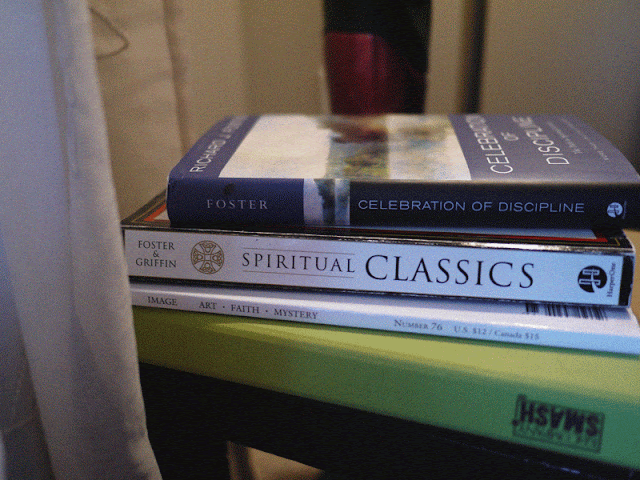"The history of religion is the story of an almost desperate scramble to have a king, a mediator, a priest, a pastor, a go-between. In this way, we do not need to go to God ourselves."
-Richard Foster
And I wonder, do I run to a go-between? Ah, yes. Books. Blogs. How much comfort and intrigue I find in reading other people's thoughts on spiritual matters. Too much time with my head in their words, however, does not leave me much time to practice the Christian disciplines and make them my own.
As I read Richard Foster's guiding words on the first inward discipline of meditation, I realize I need to close my books, switch off the computer, open the curtains to reveal a windowful of created inspiration, quiet my heart, center my prayer, and breathe.
Unlike eastern meditation, in which the goal is detachment from the material world, Christian meditation is meant to form an attachment to God, to linger in the quiet space long enough to make that mental pilgrimage to the throne room.
Pick a space. Make it pretty and comfortable. Tell the kids about it so they are thoughtful and gentle with their inevitable interruptions. Better yet, rise before they awake. Here is mine...
Employ the imagination. Jesus made constant appeals to our imagination when he taught through image-driven parables. One morning I pictured a shield around my son, who is often in my prayers as he navigates new territory. I drew the image in my journal and found corresponding psalms to pray for him. Oh, the fruit of meditation.
I am drawn to the art of lectio divina, or sacred reading, to guide my meditation. Slow, deliberate, searching, reflective, responsive. Some people are motivated by reading through their Bibles in a year, but I've found this disheartening and empty. Others love inductive study, looking up word roots and cross-references. I would rather approach my time in the Word like Bonhoeffer, completely enveloped in one verse for a week, over skimming four chapters a day or flipping around in my Bible. But this is just a personal preference at this point in my life.
Otium sanctum means holy leisure, and I've found that it can be employed in a busy life by first setting aside time to meditate and by cultivating an attitude of prayer throughout the day.
"There is a way of ordering our mental life on more than one level at once. On one level we may be thinking, discussing, seeing, calculating, meeting all the demands of external affairs. But deep within, behind the scenes, at a profounder level, we may also be in prayer and adoration, song and worship, and a gentle receptiveness to divine breathings."
-Thomas Kelly
Time for me to close the books, turn off the laptop, and practice.




Keen observations. In my experience, discipline is difficult to develop. I guess that's why we are doing this crazy fast. Thanks for the encouragement and insights. Kathy B
ReplyDeleteWhat a wonderful encouragement, Jill. Thank you for sharing this invitation with us. My husband has had this book on our shelves since he read it for a college course 16+ years back. He said it was good, but was sparse on explanation. Now I have some anointed motivation to crack it open. I'm so thankful the Lord longs for relationship with us over religion.
ReplyDelete